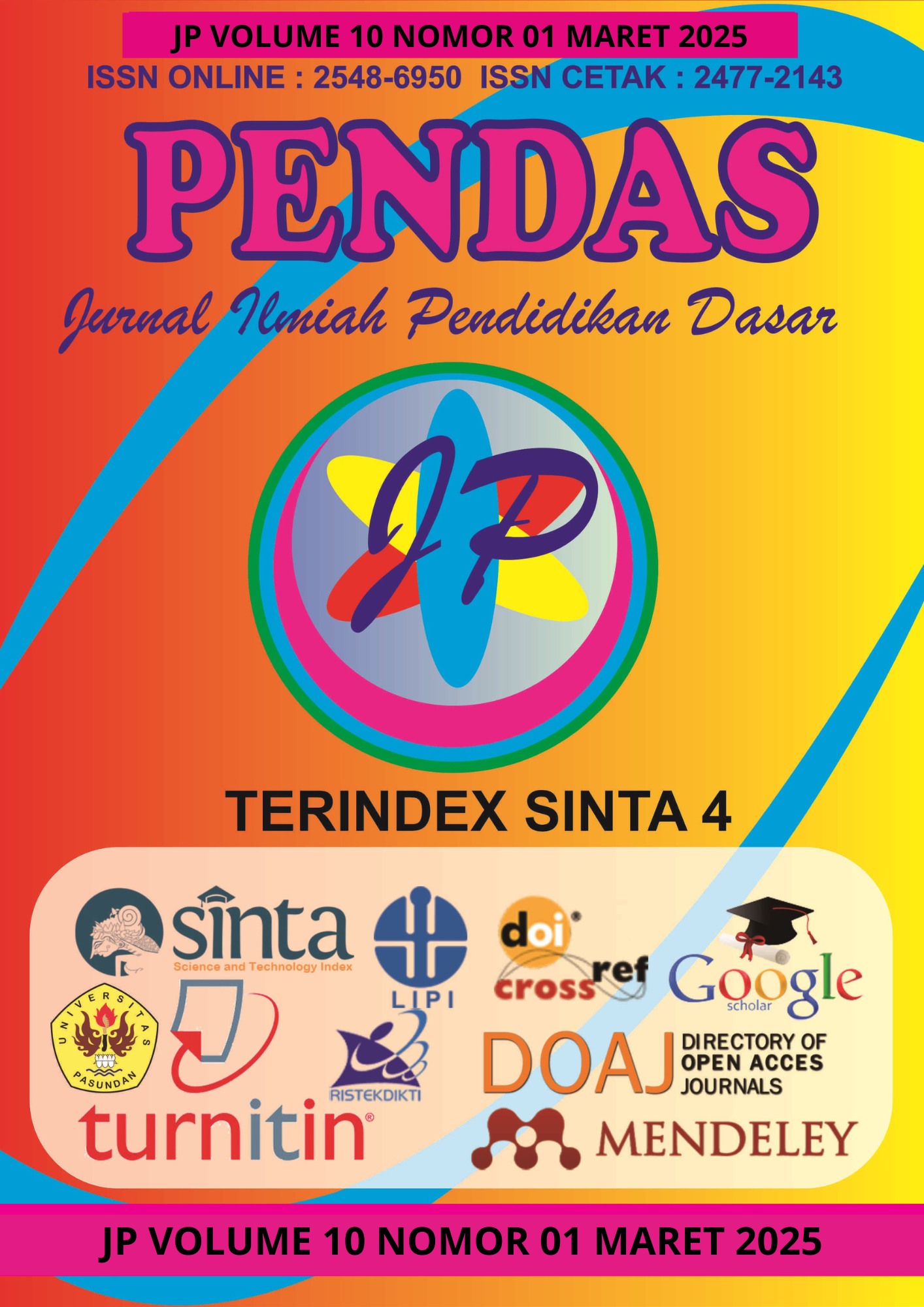PENGARUH FLIPBOOK TERHADAP PEMAHAMAN KONSEP BANGUN RUANG KELAS V SEKOLAH DASAR
DOI:
https://doi.org/10.23969/jp.v10i01.23695Keywords:
Flipbook, Concept understanding, Learning MediaAbstract
This study aims to analyze the effect of using flipbook-based learning media on the understanding of spatial concepts in mathematics subjects for fifth grade elementary school students. The method in this study is a quasi-experimental non-equivalent control group design. The population was 76 students, the sample selection used purposive sampling and the sample used was 52 students. Data collection techniques used tests and non-tests. The results of hypothesis testing with a simple linear regression test, obtained a tcount value> ttable, namely 8.969> 2.056 which indicates an influence and an R square value of 0.744 was obtained which means that 74.4% of the variables in understanding the concept of mathematical spatial geometry material are influenced by the use of flipbook media, while the remaining 25.6% are influenced by other factors outside the variables studied. In addition, the Fcount result of 75.617 with a Sig. value of 0.001 indicates that the regression model used in this study is significant. Furthermore, based on the results of the independent sample t-Test between the experimental class using flipbook media and the control class, it was obtained that tcount> ttable, namely 2.049> 2.009. The results of this hypothesis test prove that there is a significant influence of the use of flipbook media on the understanding of the concept of spatial shapes in the fifth grade mathematics subject at SD Negeri 2 Way Halim Permai.
Downloads
References
Adi Apriadi Adiansha, Husnul Khatimah, & Asriyadin. (2020). Pengembangan Kreativitas Dalam Pembelajaran Matematika Melalui Model Brain Based Learning Siswa Sekolah Dasar. Jurnal Pendidikan Mipa, 10(1), 45–52.
Agrifina, V. F., Vrisilia, V., Agustina, L. N., Supriyadi, & Izzatika, A. (2024). Pentingnya Motivasi Belajar Dalam Meningkatkan Hasil Belajar Siswa Di Sekolah Dasar. Jurnal Pedagogik Dan Dinamika Pendidikan, 12(2), 413–413. p/pedagodika,
Darajat, J., & Abduljabar, B. (2014). Aplikasi Statistika Dalam Penjas. In Bandung: CV. Bintang Warliartika.
Endaryati, S. A., Atmojo, I. R. W., Slamet, S. Y., & Suryandari, K. C. (2021). Analisis E-Modul Flipbook Berbasis Problem Based Learning untuk Memberdayakan Keterampilan Berpikir Kritis Pembelajaran IPA Sekolah Dasar. DWIJA CENDEKIA: Jurnal Riset Pedagogik, 5(2), 300.
Fauzi, I., & Arisetyawan, A. (2020). Analisis Kesulitan Belajar Siswa Pada Materi Geometri. Jurnal Sosial Teknologi, 11(1), 28–35.
Fauziah, R. H., & Ruqoyyah, S. (2022). Kemampuan pemahaman konsep pada materi bangun ruang melalui model pembelajaran contextual teaching and learning pada siswa kelas v sekolah dasar. Journal of Elementary Education, 5(11), 188–198.
Hartanti, M. N., Rapani, R., Astuti, N., & Muncarno, M. (2021). Hubungan Pendampingan Orangtua Dan Motivasi Belajar Dalam Pembelajaran Daring Dengan Hasil Belajar Tematik Peserta Didik. Metodik Didaktik, 17(1), 11–20.
Juliani, R., & Ibrahim, N. (2023). Pengaruh Media Flipbook Terhadap Hasil Belajar Bahasa Indonesia Siswa Kelas IV Di Sekolah Dasar. ELSE (Elementary School Education Journal), 7(1), 20–26.
Juwantara, R. A. (2019). Analisis Teori Perkembangan Kognitif Piaget pada Tahap Anak Usia Operasional Konkret 7-12 Tahun dalam Pembelajaran Matematika. Al-Adzka: Jurnal Ilmiah Pendidikan Guru Madrasah Ibtidaiyah, 9(1), 27.
Kuncoro, S. J., & Fitrianawati, M. (2023). Media Pembelajaran Flipbook Berbasis Kontekstual. Jurnal Genesis Indonesia, 2(03), 103–113.
Mayer, E, R. (2009). Multimedia Learning. Cambridge: Cambridge University Press.
Nurfadhillah, S., Ningsih, D. A., Ramadhania, P. R., & Sifa, U. N. (2021). Peranan Media Pembelajaran Dalam Meningkatkan Minat Belajar Siswa SD Negeri Kohod III. PENSA : Jurnal Pendidikan Dan Ilmu Sosial, 3(2), 243–255.
Rindy Ayu Angelia, Navatika Vivayosa Br Surbakti, Alfredo Batubara, & Syahrial Syahrial. (2024). Pengaruh Penggunaan Media Digital Flipbook terhadap Hasil Belajar Siswa Kelas V Materi Bilangan Pecahan Matematika Sekolah Dasar. Katalis Pendidikan : Jurnal Ilmu Pendidikan Dan Matematika, 1(2), 147–154.
Setya Hermawan, J., Surahman, M., Rini, R., Amaliyah, F., & Fitria Rohmah, M. (2023). Pengaruh Minat Belajar Dan Efikasi Diri Terhadap Hasil Belajar Matematicka Peserta Didik Kelas V Sekolah Dasar. Jurnal Inovasi Sekolah Dasar, 10(2), 94–105.
Sugiyono, D. (2016). Metode Penelitian Kuantitatif pendidikan. Alfabeta, Bandung
Vikiantika, A., Nurita;, P., & Yoeni, E. (2022). Peningkatan Hasil Belajar Siswa Sekolah Penggerak pada Mata Pelajaran Matematika melalui Media Pembelajaran Berbasis Flipbook. Jurnal Basicedu, 6(4), 5877–5889.
Downloads
Published
Issue
Section
License
Copyright (c) 2025 Pendas : Jurnal Ilmiah Pendidikan Dasar

This work is licensed under a Creative Commons Attribution 4.0 International License.














































